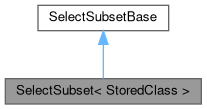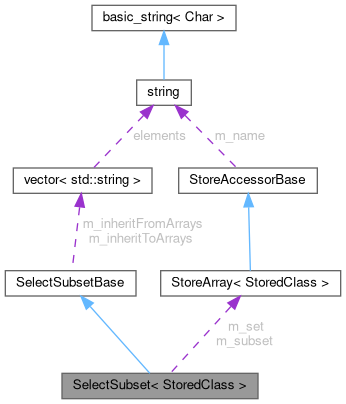 |
Belle II Software light-2505-deimos
|
 |
Belle II Software light-2505-deimos
|
Class to create a subset of a given StoreArray together with the relations with other StoreArrays. More...
#include <SelectSubset.h>


Public Member Functions | |
| SelectSubset () | |
| Constructor. | |
| ~SelectSubset () | |
| Destructor. | |
| void | registerSubset (const StoreArray< StoredClass > &set, DataStore::EStoreFlags storeFlags=DataStore::c_ErrorIfAlreadyRegistered) |
| Remove all non-selected objects from set. | |
| void | registerSubset (const StoreArray< StoredClass > &set, const std::string &subsetName, DataStore::EStoreFlags storeFlags=DataStore::c_ErrorIfAlreadyRegistered) |
| Register the StoreArray<StoredClass> that will contain the subset of selected elements. | |
| template<class T, class ... MoreArguments> | |
| void | inheritRelationsFrom (const StoreArray< T > &array, MoreArguments... moreArgs) |
| Inherit relations pointing from Other to objects selected into this subset. | |
| template<class T, class ... MoreArguments> | |
| void | inheritRelationsTo (const StoreArray< T > &array, MoreArguments... moreArgs) |
| Inherit relations pointing from objects selected into this subset to Other. | |
| void | inheritAllRelations () |
| Automatically inherit all relations to or from the original set (if registered when calling this function). | |
| void | select (const std::function< bool(const StoredClass *)> &f) |
| This method is the actual worker. | |
| StoreAccessorBase * | getSet () override |
| Get accessor for original set. | |
| StoreAccessorBase * | getSubSet () override |
| Get accessor for reduced set. | |
| std::vector< std::string > | getInheritFromArrays () const |
| Get list of arrays we inherit relations from. | |
| std::vector< std::string > | getInheritToArrays () const |
| Get list of arrays we inherit relations to. | |
| bool | getInheritToSelf () const |
| Do we inherit relations from original set to itself? | |
| void | swapSetsAndDestroyOriginal () |
| Swap set and subset (+relations), and keep only the reduced set. | |
Protected Member Functions | |
| std::map< int, int > | copySetWithRelations (std::function< bool(const StoredClass *)> f) |
| Selects the elements, fill the subset and copies all the relations in which the set is involved. | |
| void | copyRelationsToSelf () |
| Copy any set -> set relations between selected objects. | |
| void | inheritRelationsFrom () |
| Empty method to stop the recursion of the variadic template. | |
| void | inheritRelationsTo () |
| Empty method to stop the recursion of the variadic template. | |
Protected Attributes | |
| StoreArray< StoredClass > * | m_set = nullptr |
| The array we use as input. | |
| StoreArray< StoredClass > * | m_subset = nullptr |
| The array we create. | |
| DataStore::EStoreFlags | m_subsetFlags = DataStore::c_WriteOut |
| Flags used for m_subset. | |
| std::vector< std::string > | m_inheritFromArrays |
| array names we inherit relations from. | |
| std::vector< std::string > | m_inheritToArrays |
| array names we inherit relations to. | |
| bool | m_inheritToSelf = false |
| If true, relations from set objects to set objects are copied. | |
| bool | m_reduceExistingSet = false |
| If true, non-selected candidates are removed from m_set, m_subset only exists temporarily. | |
Class to create a subset of a given StoreArray together with the relations with other StoreArrays.
The class SelectSubset selects a subset of objects contained in a given StoreArray creating at the same time a set of relations with objects contained in other StoreArrays that are the natural restrictions on the subset of the relations "from" or "to" the original one.
Assuming you have a StoreArray called 'particles' that contains objects of type Particle you can use SelectSubset to select particles with a given feature and put them in another StoreArray called, as an example,'oddParticles'.
First you need to add a SelectSubset to your module as a member variable:
In the initialize method of your module you have to initialize the SelectSubset
The SelectSubset class will take care of creating the new StoreArray<Particle>, register it into the datastore with name "oddParticles" same durability and same persistent attributes of the original one.
Inheritance of relations can also be configured here, see "Relations" section below.
To create the subset you have to specify the selection criterium. You can do that in two possible ways.
You can define your C++ function and then use it. E.g:
Then in the event method of your module:
You can specify a lambda expression as parameter of the select method. E.g.: in the event method of your code:
with the advantage of an easy capture of module parameters. E.g. to count the number of rejected particles:
By default the class SelectSubset produces a one to one relation from the set to the subset by which you can interpret all the relations from and to the original set. E.g. The original StoreArray<Particle> is in relation To the StoreArray<MCParticle>. You can use the relation from the set to the subset and then from the set to the MCParticles. This can be quite tedious, so you can ask SelectSubset to produce the natural restrictions of the relations from and to the original set.
If you want your subset to have the same relations as for the original set, you can simply use
Alternatively, you can specify the arrays you want to inherit from/to manually:
Assuming there is a relation from your original set to other arrays A and B, you can inherit these relations for all objects selected into your subset using:
Relations pointing from objects in other arrays to objects in the original set can also be inherited in a very similar way:
If there are relations from objects in the original set to other objects in the same array (e.g. Particles -> Particles), you can also inherit these by doing
Note that both objects related must pass the selection criteria, or there would be one missing partner in the relation.
Definition at line 193 of file SelectSubset.h.
|
inline |
|
inline |
Destructor.
Definition at line 201 of file SelectSubset.h.
|
inlineinherited |
Get list of arrays we inherit relations from.
Definition at line 32 of file SelectSubset.h.
|
inlineinherited |
Get list of arrays we inherit relations to.
Definition at line 34 of file SelectSubset.h.
|
inlineinherited |
Do we inherit relations from original set to itself?
Definition at line 36 of file SelectSubset.h.
|
inlineoverridevirtual |
Get accessor for original set.
Implements SelectSubsetBase.
Definition at line 325 of file SelectSubset.h.
|
inlineoverridevirtual |
Get accessor for reduced set.
Implements SelectSubsetBase.
Definition at line 327 of file SelectSubset.h.
|
inline |
Automatically inherit all relations to or from the original set (if registered when calling this function).
Equivalent to calling inheritRelationsFrom()/To() for all related arrays.
Note: Do not combine with inheritRelationsFrom() and inheritRelationsTo().
Definition at line 301 of file SelectSubset.h.
|
inlineprotected |
Empty method to stop the recursion of the variadic template.
Definition at line 337 of file SelectSubset.h.
|
inline |
Inherit relations pointing from Other to objects selected into this subset.
You can specify an unlimited number of arrays as arguments to this function.
Definition at line 250 of file SelectSubset.h.
|
inlineprotected |
Empty method to stop the recursion of the variadic template.
Definition at line 339 of file SelectSubset.h.
|
inline |
Inherit relations pointing from objects selected into this subset to Other.
You can specify an unlimited number of arrays as arguments to this function.
Definition at line 275 of file SelectSubset.h.
|
inline |
Register the StoreArray<StoredClass> that will contain the subset of selected elements.
| set | The StoreArray<StoredClass> from which the elements will be selected |
| subsetName | The name of the StoreArray<StoredClass> that will contain the selected elements |
| storeFlags | ORed combination of DataStore::EStoreFlags. |
Definition at line 229 of file SelectSubset.h.
|
inline |
Remove all non-selected objects from set.
All relations registered so far are retained. TODO: consider moving this into StoreArray itself
| set | The StoreArray<StoredClass> from which to retain only selected elements |
| storeFlags | flags used for temporary arrays and relations. Should be changed from the default if you want multiple instances. c_DontWriteOut is always used. |
Definition at line 215 of file SelectSubset.h.
|
inherited |
Swap set and subset (+relations), and keep only the reduced set.
Subset and associated relations will be empty afterwards.
Definition at line 14 of file SelectSubset.cc.
|
protectedinherited |
array names we inherit relations from.
Definition at line 54 of file SelectSubset.h.
|
protectedinherited |
array names we inherit relations to.
Definition at line 56 of file SelectSubset.h.
|
protectedinherited |
If true, relations from set objects to set objects are copied.
(if both objects are selected!).
Definition at line 58 of file SelectSubset.h.
|
protectedinherited |
If true, non-selected candidates are removed from m_set, m_subset only exists temporarily.
Definition at line 60 of file SelectSubset.h.
|
protected |
The array we use as input.
Definition at line 342 of file SelectSubset.h.
|
protected |
The array we create.
Definition at line 344 of file SelectSubset.h.
|
protected |
Flags used for m_subset.
Definition at line 346 of file SelectSubset.h.